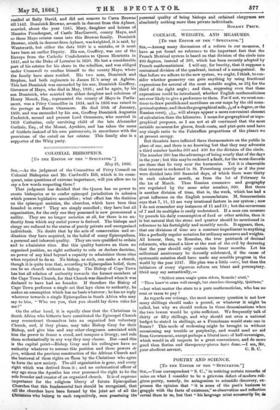COLONIAL BISHOPRICS.
[To THE EDITOR OF THE "SPECTATOR."]
May 21, 1866.
SIR,—As the judgment of the Committee of Privy Council on Colonial Bishoprics and Mr. Cardwell's Bill, which is its conse- quent, raise questions of extreme importance, will you allow me to say a few words respecting them?
That judgment has decided that the Queen has no power to create bishoprics or to confer episcopal jurisdiction in colonies which possess legislative assemblies ; what effect has the decision on the episcopal societies, the churches, which have been thus founded in error ? They are simply annulled ; they have lost all organization, for the only one they possessed is now pronounced a nullity. They are no longer societies at all, for there is no au- thority from which any social power is derived. The bishops and clergy are reduced to the status of purely private and unorganized individuals. No doubt that by the acts of consecration and or- dination they have acquired, in the belief of many Episcopalians, a personal and inherent quality. They are men qualified to ordain and to administer rites. But this quality bestows on them no organized position, no right authority to rule or declare doctrine, no power of any kind beyond a capacity to administer those rites when required to do so. No bishop, as such, can make a church, though it is quite true that, according to Episcopalian belief, there can be no church without a bishop. The Bishop of Cape Town has lost all relation of authority towards the former members of the Cape Town Church, for that Church was dissolved when it was declared to have had no founder. If therefore the Bishop of Cape Town performs a single act that lays claim to authority, he makes an assumption which has no basis whatever ; he has no reply whatever towards a single Episcopalian in South Africa who may say to him, "Who are you, that you should lay down rules for me?"
On the other hand, it is equally clear that the Christians in South Africa who hitherto have constituted the Episcopal Church may reconstruct themselves into an organized but voluntary Church, and, if they please, may take Bishop Gray for their Bishop, and give him and any other clergymen associated with him the power to frame a creed, and compose a liturgy, and rule them ecclesiastically in any way they may choose. But —and this is the capital point—Bishop Gray and his colleagues have no authority whatever to assume this position and these powers de jure, without the previous construction of the African Church and the bestowal of these rights on them by the Christians who agree to form the new society. The old organization is gone, and every right which was derived from it ; and no ecclesiastical officer of any age since the Apostles has ever possessed the right to be the sole founder and creator of an organized church. It is of supreme importance for the religious liberty of future Episcopalian SIR,—Your correspondent "s. C.," in noticing certain remarks of mine on what I consider to be a grievous defect of modern reli- gious poetry, namely, its antagonism to scientific discovery, ex- Churches that this fundamental fact should be recognized, that presses the opinion that "it is none of the poet's business to till the churches have been formed by the joint act of all the I grapple with the facts of existence," as observation and reflection Olsristians who belong to each respectively, men possessing the reveal them to us, but that "his language znUst necessarily lie;
personal quality of being bishops and ordained clergymen are absolutely nothing more than private individuals.
BONAMY PRICE.






























 Previous page
Previous page